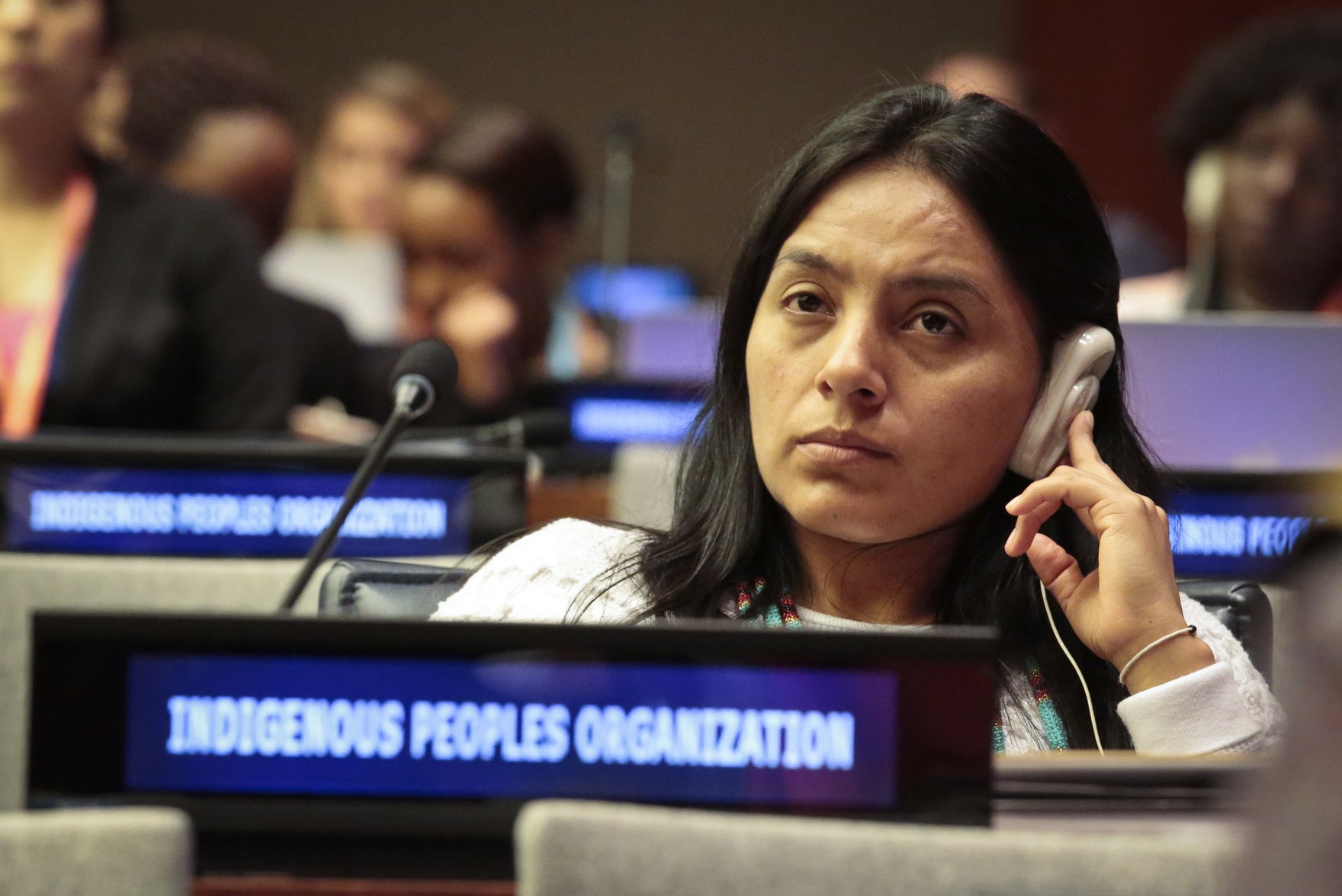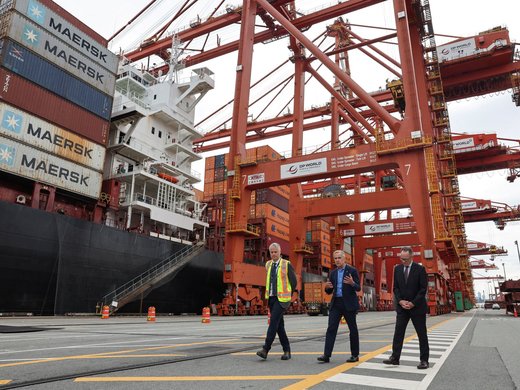When Sandra Lovelace returned to the Tobique First Nation following the end of her marriage, the Maliseet woman found herself and her children cut off from services and stripped of her Indigenous status under Canadian law because she had been married to a non-Indigenous man.
The path to justice would lead Lovelace to the United Nations, underlining how global governance and international law have helped show where domestic law has failed to protect vulnerable women and girls.
As the UN Commission on the Status of Women holds its sixty-first meeting in New York City from March 13 to 24, this is a good moment to reflect on how international law can help strengthen human rights and protect the most vulnerable; enrich domestic law for women’s economic empowerment; and inspire our leaders and light the way to making international trade and investment law inclusive of women’s needs, perspectives and ambitions.
Today, Canada’s greatest human rights issue remains treatment of and governance for Indigenous peoples. Indigenous women suffer multiple burdens of disadvantage, as has been made painfully obvious by the cases of 1,200 murdered and missing Indigenous women. But there is some progress. A woman from the Kwakwaka'wakw nation, Jody Wilson-Raybould, is the first Indigenous minister of justice and, with the full support of the Trudeau government, has finally launched a national inquiry into this crisis. Only when Indigenous women and girls can live without fear of violence, discrimination and abuse and can participate fully in economic life will women’s empowerment in Canada be fully achieved. The Canadian government’s endorsement of the Truth and Reconciliation Commission’s Calls to Action and its recent commitment to “embrace” the UN Declaration on the Rights of Indigenous Peoples provide substantial guidance for these efforts at eliminating historic discrimination and achieving economic empowerment.
The Lovelace case is so far the only one under the UN’s Optional Protocol to the International Covenant on Civil and Political Rights (ICCPR) involving Canada that is relevant to women’s equality. Mary Two-Axe Earley, Jeannette Lavell, Yvonne Bedard and Lovelace sought equal status for Indigenous women under the Indian Act. Lovelace claimed a violation of the right to enjoy her culture (ICCPR article 27) due to provisions of the Indian Act that stripped Indigenous women of their status if they married non-Indigenous men. She succeeded in her claim, resulting in amendments in 1985 to the Indian Act to return status to those who had lost it.
There have been four recorded complaints against Canada under the Optional Protocol to the Convention on the Elimination of all Forms of Discrimination Against Women (CEDAW), three of which were determined to be inadmissible. In the one case considered on its merits, brought by Cecilia Kell over loss of housing, the CEDAW Committee found that Canada failed to fulfill its obligations under articles 2(d), 2(e) and 16 to pursue a policy of eliminating discrimination against women and of eliminating discrimination against women in all matters relating to marriage and family relations, respectively. The Committee found discrimination based on the intersection of gender, spousal abuse and being indigenous, ruling that States parties must legally recognize and prohibit such intersecting forms of discrimination and their compounded negative impact on the women concerned. The Committee recommended that Ms. Kell receive compensation as well as equivalent replacement housing, and that the State increase access to Indigenous female duty counsel and ensure access to justice for victims of domestic violence.
In its 2016 report on Canada’s periodic review under the CEDAW, the Committee made numerous recommendations. It recommended that Canada properly disseminate information about and give full effect to the Convention, the Optional Protocol and the Committee’s general recommendations; remove all remaining discriminatory provisions of the Indian Act; strengthen gender mainstreaming; promote the justiciability of CEDAW rights, allowing them to be adjudicated by courts; and train judges and lawyers about the Convention. There is now clear direction from the Supreme Court of Canada in Divito v Canada (Public Safety and Emergency Preparedness) that the Canadian Charter of Rights and Freedoms “should be presumed to provide at least as great a level of protection as is found in the international human rights documents that Canada has ratified.” Thus, the federal, provincial and territorial governments need to know the content of international human rights instruments that Canada has ratified, such as the convention on discrimination against women, and conscientiously give them full effect.
The Committee commended Canada on the appointment of a Cabinet of federal ministers with gender parity, and noted the high number of women judges on the Supreme Court (4 of 9) and other levels of the judiciary, but expressed concern about low representation of women in territorial assemblies (26 percent), mayors (28 percent), councillors (18 percent), the House of Commons (26 percent) and Senate (37 percent), a figure that includes Lovelace, who went on to become the first Indigenous woman appointed to Canada’s Senate. The Committee recommended adopting measures to address structural obstacles to realization of women’s political rights and engagement in public life, and developing training and mentoring programs for leadership and negotiation skills.
With respect to employment, it was recommended that women be encouraged to enter non-traditional professions, and that the government adopt a rights-based national childcare framework to facilitate more opportunities for women to work full time, and develop confidential and safe systems for addressing sexual harassment in the workplace. Increased funding and strengthening strategies to address discriminatory stereotypes and structural barriers that deter girls from higher education in science, technology, engineering and mathematics, and ensuring zero-tolerance policies on violence and harassment in all schools were also recommended.
With regard to economic empowerment of women, the Committee recommended that there be adequate social assistance, sufficient numbers of affordable childcare facilities and affordable and adequate housing options.
The Committee was also concerned about the negative impact of the conduct of Canadian transnational companies, in particular in mining, and the impact they have on the rights enshrined in the Convention for local girls and women. The Committee expressed concern about the inadequate legal framework to hold all companies and corporations from Canada accountable for abuses of women’s human rights committed abroad; the limited access to judicial remedies by women victims; and the absence of an effective independent mechanism for investigation of complaints. It recommended that legislation be enacted to govern the conduct of corporations registered or domiciled in Canada in relation to activities abroad, and that Canada introduce an effective investigation mechanism, adopt measures to facilitate access to justice and ensure these take into account a gender perspective. The Committee recommended that in negotiating trade and investment agreements Canada recognize the primacy of international human rights obligations over investors’ interests, so that investor-state dispute settlement does not create obstacles to full compliance with the convention on discrimination against women.
Current Minister of Global Affairs and former Minister of Trade Chrystia Freeland has promoted a progressive trade and investment agenda that supports economic empowerment of women and other aspects of the 17 Sustainable Development Goals (environmental protection, reduction of inequality, ending poverty, providing access to justice for all, building inclusive and accountable institutions, etc.). The recognition of a link between gender and the ability to participate in international trade and investment has periodically drawn attention at the global level. Throughout 2015 and 2016 work from the UN’s Conference on Trade and Development (UNCTAD) and UN Women has been consistent, and the World Trade Organization’s (WTO’s) 2016 Public Forum’s theme, “Inclusive Trade,” seems to have been linked, as does the report of the UN Secretary-General’s High-Level Panel on Women’s Economic Empowerment, Leave No One Behind.
Gender equality measures within the trade arena are supported by the Sustainable Development Goals, human rights instruments and the gender-specific Beijing Platform for Action +20 (2015). On International Women’s Day, UNCTAD released a statement that “gender equality remains the greatest human rights challenge. Economic empowerment is a uniquely potent way for women to achieve greater control over their own lives. Inclusive growth cannot occur without their full participation.” Dr. Mukhisa Kituyi was quoted, saying, “Women’s economic empowerment is a game-changer for development. We should leave no one behind for the 2030 Agenda…To get to the future with substantive change and accomplish the 2030 Agenda, we will have to drastically change the current situation and encourage for substantive equality at all levels.”
Various studies have been conducted concerning the link between economic development and gender-neutral trade policy, agreements and rules. One outcome from this research is consensus that gender-neutral trade policies, agreements and rules have the potential to detrimentally impact women because they may exacerbate existing social and economic situations that preclude women from full and equal participation in trade. In response to this, several non-governmental organizations and countries have commenced programs to support and train women in trade, and further, to analyze the impact of trade policies, agreements and rules on women in trade. Gender has been raised in various fora connected to the WTO, such as in WTO ministerial side events, in WTO public fora and by aid-for-frade partners. However, there has been a general reluctance to incorporate solutions into the WTO institutional structure or its substantive rules.
The gender and trade link is well known. Over the years the WTO has gradually been gaining awareness of the relevance of human rights, labour standards, sustainable development and environmental protection to WTO work. There is already a strong base of support from WTO members and civil society for gender-based impacts of trade to be eliminated. Members should now start showcasing actions and initiatives that will help to achieve gender-inclusive trade. Leave No One Behind, the report of the UN High-Level Panel on Women’s Economic Empowerment, offers practical actions that states can take to promote equitable treatment of women employees and secure opportunities for women entrepreneurs in e-commerce and global value chains. Action by WTO members in raising gender issues in negotiation proposals, as well as in trade policy reviews, and in taking domestic action to include women in trade, would promote the issue within the WTO and could engender much-needed revitalization of this institution of global governance. (It is noteworthy that there have been and continue to be Canadian women lawyers providing legal leadership for women’s economic empowerment at the WTO, such as Debra Steger, Valerie Hughes, Victoria Donaldson, and at the International Centre for Settlement of Investment Disputes, such as Meg Kinnear.)
Meanwhile, at the meetings of the Commission on the Status of Women in New York, the slogan invoked by the UN, “No woman left behind,” reminds us that success in economic empowerment of women means empowering all women, including those made vulnerable by multiple, intersecting disadvantages.
As Lovelace’s story illustrates, international human rights law has helped show where Canadian law fails our most vulnerable — Indigenous women and girls. Now that the Supreme Court has finally clarified that the Canadian Charter protects all the international human rights contained in treaties that Canada has ratified, it is worth underlining that international human rights law holds tremendous potential to enrich domestic law for women’s economic empowerment in Canada. As well, it can inspire our leaders and light the way to make international trade and investment law inclusive of women’s needs, perspectives and ambitions.
Additional reporting by Kim Jensen, an articling student with the International Law Research Program at the Centre for International Governance Innovation



